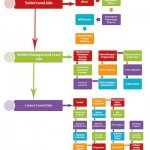What next after A/L?
View(s):Choosing a field of studies is always a tricky one for the students as well as parents. So it is important to be informed about the job market and the advantage when deciding on the future career path. Being aware of the environment that one lives in helps to be successful in life. Many individuals are caught up in the barrier of unemployment, one because of choosing the popular trend without considering the demand of the job.
This is to give a glimpse about the best fields to focus your studies on.
This era is the dawn of the fourth industrial revolution and it has paved way to change our lives like never before. This is blurring of boundaries between the physical, digital, and biological worlds. It’s a fusion of advances in artificial intelligence (AI), robotics, the Internet of Things (IoT), 3D printing, genetic engineering, quantum computing, and other technologies. In fact the highest opportunities rise in the Computer Industry. Today it is not an isolated field but the connecting factor for many other fields.
There are two main branches of ICT are computer science and information technology. These two careers though has emerged from the same subject has different requirements. IT career involves installing, organising and maintaining computer systems as well as designing and operating networks and databases. Computer science is focused entirely on efficiently programming computers using mathematical algorithms.
Computer Industry
Computer industry has risen with a huge drift especially in last two decades. Computer industry has further got many fields but the hierarchy of computer related jobs mostly remains in a simple and customised manner.
There are numerous technologies which offer promising career to fresh graduates in different fields associated with computers and information technology. The hierarchy of jobs is quite high and so these all cannot be explained here. So only some of the major levels in computer job hierarchies are described in brief as below in this article in a manner of ascending order.
COMPUTER SCIENCE
Computer science has virtually affected every industry, and it has become a growing and a thriving field of study. Among the most demanding degrees for this are the specialised management information systems. It is believed that the growth of computer science will increase by 18% by 2020, with an average salary of $60000 which increases with experience and qualification apart from the range of the company.
INFORMATION TECHNOLOGY
Information Technology too is a flourishing industry since it is expanding rapidly. IT focuses on the intersection of computer systems both software and hardware which uses these tools to share data and securely set it up to use and store information. These jobs pay salaries of $ 80000- $100000 since they require high skills. Since IT field adds on new jobs rapidly, it is expected to grow in 12% by 2026.Continued on page 22
Requirements for the fields
A computer science degree gives students the accurate education in discrete mathematics and computer science theory. Most CS graduates go on to become software developers or Web programmers, and those who continue on to graduate-level schooling have the chance to do research or work in more specialized roles, such as advanced artificial intelligence programming.
With a four-year Computer Science degree, students can find employment as programmers, software engineers or IT professionals. To become a software developer, graduates usually must learn a small amount of programming. A CS education prepares students to choose the correct design patterns, algorithms and data structures for programs, but most students graduate knowing only one or two programming languages, usually C++, Python or Java. For most corporate programming jobs, C++ alone might be sufficient, but a professional software developer should know several other languages, including HTML, CSS, JavaScript, MySQL, PHP, Python and Java.
Software developer jobs are projected to grow 22 percent over the next 10 years, well above average. In 2012, the median annual salary of a developer was $93,350, with the highest-earning 10 percent making at least $138,880.
Levels of careers
There are different layers of the industry if you are targeting a job it is better for you to know which to target and how to work for it.
Basic Level
The individuals at this level are the professionals who have specialized in one of the technology related with computers and IT. These professionals manage certain parts of technical processes depending on their subject matter expertise. Many different profiles are served by professionals at this level. Also these professionals are fresh graduates or the ones who possess little experience in their field. From this level onwards, the professionals start taking bigger leaps in their career within the field of their specialization.
Middle Management Level Jobs
This level features the job profiles at middle managerial levels. The professionals at this level of computer jobs hierarchy are associated with individual technical departments and manage those departments by applying their technical & managerial skills. The major task performed by the professionals at this level is to manage the individual activities and project segments to lead the project towards completion within the assigned budget and stipulated deadline.
Senior Level Jobs
The professional at this level are more involved into decision-making processes. They overlook the entire technical work in the organization. Professionals at this level require broad corporate perspective, good communication skills and great technology knowledge. Following are few profiles that acquire highest level in the hierarchy.
QUALIFICATIONS
There are two options. One you can go by the traditional model, get yourself a degree in IT can be from a government university, the BIT or from a UK university. The second option is to get yourself professionally qualified certified. These are short term programmes. You can acquire networking qualifications from SISCO, the programming certifications from Oracle from Java, the Microsoft certification for programming, systems administration and so on. It will be faster than doing a degree and in terms of salary since you are getting employed faster; you can start earning faster and you and go up in the career ladder faster. Either get yourself academically certified or professionally certified but most follow both pathways.
If you get certified in Microsoft oracle or so on they have a validity period for their certificate and a new version is going to come up so you need to upgrade and re-certify yourself. If you come with a certificate of 2003 saying that you know how to manage the system; it is not going to help. And those who go by the professional pathway have to recertify themselves.
Language barrier
When it comes to learning IT or trying to get employed in the field, many will think twice because of the language. In fact, to learn and go forward in IT you don’t have to be an expert in English. If you can understand the basic fundamental skills of English, you can create your path. People shouldn’t be afraid of coming into IT saying that their English is bad. There are many who perform their task excellently as graphic designers and even people some who do coding though they have really poor English language skills. If you are focussing on the foreign job market, then English becomes a basic requirement.
Drawing comparisons
When comparing the foreign job market with the Sri Lankan, the foreign job market pays more. A software engineer with 5-6 years of experience would be earning something like 250, 000 in Sri Lanka but when that same person goes to Dubai and he could be earning very easily 4 times that. In USA he would be earning 10 times that.
As a whole the increasing trends of the fast moving world has created more opportunities that are biased to the technology sector and IT is at the centre of it. So, choosing a career path in It would not be a wrong decision, when considering the future but, you should also think about your interest, determination and your ability of performance.
-Madhusha Dep-






